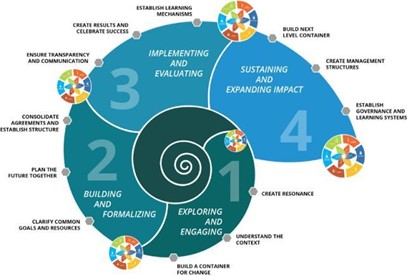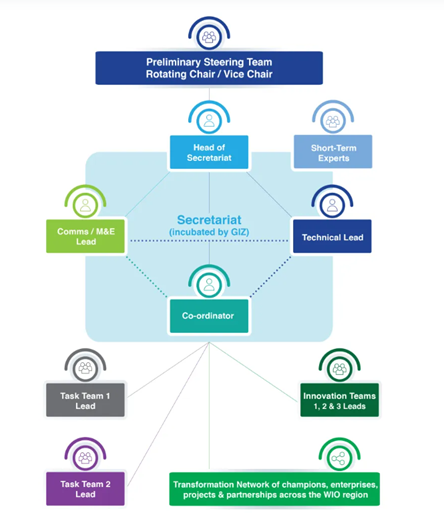


Partners of Our Blue Future (OBF) model a culture of dialogue and collaboration, and work together as peers through a multi-stakeholder approach - a structured, transparent, and participatory collaboration between two or more stakeholder groups working towards a common goal. It offers an opportunity to generate innovative, appropriate, locally owned, and ultimately sustainable solutions, supporting transformative change.
The multi-stakeholder approach is reflected in OBF’s set-up:
- The Preliminary Steering Team co-designs the strategy, steers the alliance, monitors implementation, and evaluates impact
- Multi-stakeholder Task Teams support the development of governance, stakeholder engagement, and communication strategies
- a Secretariat ensures smooth operation and coordination
- Innovation Teams tackle critical, sector-specific challenges through concrete actions and projects
- a Transformation Network includes multi-stakeholder partnerships across the WIO region.
The Collective Leadership Institute (CLI) plays a key role in supporting OBF’s multi-stakeholder approach and strengthening the capacities of its members. It contributes expertise in bringing leadership concepts to enliven the alliance by encouraging a high-quality, inclusive, and action-oriented stakeholder engagement and dialogue process within OBF.
-
Partners are willing to collaborate on eye level as peers. Each partner contributes different resources and complementary competencies to maximize value and impact toward OBF’s shared vision for the WIO region.
-
Partners engaged in a very participatory and co-creative process to develop OBF’s Transformation Network Blueprint and to prioritize actions related to its objectives; ownership is high and momentum growing for further implementation.
-
Bringing together partners with different approaches, cultures, values, and interests in an equitable manner that delivers value for all requires collaboration capacity, intention, and sustained effort. Given the wide array of stakeholders, co-developing a shared vision is important to create a sense of ownership and inspiration. It also ensures full participation rights for all key stakeholder groups.
-
Establishing a mechanism to measure impact and results is necessary, alongside measuring the vitality of the OBF collaboration ecosystem to ensure that all partners continue to share a common understanding of the initiative’s relative strengths and areas for development to inform planning.